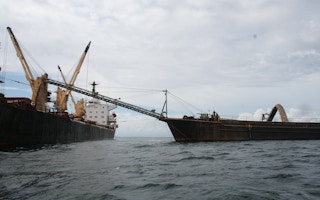An environmental and human rights group has called on Singapore to suspend all sand imports from Cambodia.
A new report released by London-based Global Witness today claims that Cambodia’s sand trade is thriving despite a recent sand export ban by its Prime Minister, and that Singapore is the primary consumer of sand exported from Cambodia.
The Singapore Government today issued a strong statement to reject the report which “suggests that the Singapore government seeks to import sand without due regard to the laws or environmental impact of the source country, in this case, Cambodia”, said Singapore’s Ministry of National Development (MND).
“This is not true. We are committed to the protection of the global environment, and we do not condone the illegal export or smuggling of sand, or any extraction of sand that is in breach of the source countries’ laws and rules on environmental protection.
“We have not received any official notice on the ban of sand exports from Cambodia,” it added.
MND said that sand suppliers are private entities and they purchase sand from sand concession holders in various source countries. These concession holders determine the source locations and undertake the extraction.
Global Witness, which has made many allegations of Cambodian cronyism in recent years, said Cambodian senators known to have close ties to premier Hun Sen have been covertly awarded licences to dredge sand.
“This situation highlights the continued failure of Cambodia’s international donors to use their leverage to hold the small elite surrounding the prime minister to account,” said campaigner at Global Witness George Boden.
The report said investigators tracked sand-filled boats from Cambodia to Singapore, estimating concessions from southwestern Koh Kong province alone netted 20 million dollars per month for some 796,000 tonnes of sand.
The report also said that the Cambodian Government’s actions “appear to have facilitated rather than limited, dredging operations” and such activities have led to the degredation of the local ecosystems of dredging sites and the plummeting of fish and crab harvests for local communities.
The group said Cambodia’s legislation only bans river sand from export, not sea sand. And the inter-ministerial committee tasked with implementing this regulation has continued to approve licences for the exploitation of both types of sand export, while also failing to ensure compliance with Cambodia’s other environmental and socio-economic legal frameworks.
Global Witness estimates the annual value of the sand trade to be US$28.7 million (S$39.6 million) in Cambodia and US$248 million (S$342 million) in retail value in Singapore.
In 2008, Singapore was the largest global importer of sand at 14.2 million tonnes valued at US$273 million. Of this total, Cambodia was Singapore’s third largest source of sand, providing 3.8 million tonnes or 21.5 per cent, after Vietnam at 45 per cent and Malaysia at 22 per cent, said the report, citing United Nations statistics.
At least one Singapore-registered company was named in the report to be working with Cambodian dredgers to supply sand to industrial landlord JTC Corp for its land reclamation activities.
Given Singapore’s ambition to be an environmental leader in the region, the country is “not doing enough to mitigate against the negative impacts of its consumption of Cambodian sand,” said Global Witness campaigner George Boden.
But MND said yesterday refuted this, noting that contracts by JTC Corp – who engages suppliers for its reclamation works – stipulate that the sand vendors have to act responsibly, and it sends out “firm reminders” to sand vendors to observe the regulations of the source countries.
JTC also requires the sand vendors to give statutory declaration that they are acting responsibly, on top of its requirement for vendors to provide various documents and licences from the source countries.
In addition, the Singapore Customs also has in place procedures to check and investigate the import of all goods, including sand, at the various checkpoints, said MND.
In its report, Global Witness also noted that some concession licences was signed and stamped by an official from Singapore’s embassy in Cambodia.
“The reason for an Embassy official stamping this document is unclear,” wrote Global Witness.
MND said in response that “the Embassy, like other Embassies, provides notarial services for the public. Document notarisation is a simple process of checking and authorising either copies of documents tendered as replicates or verification of signatures in some cases”.
MND added that the policing and enforcement of sand extraction licences is “ultimately the responsibility of the source country. However, Singapore will continue to play its part to ensure that sand is extracted in a legal and environmentally responsible manner”.
Singapore used to source the bulk of its sand from Indonesia before the country abruptly banned all sand exports to Singapore in early 2007, citing environmental reasons.
This led to a ‘sand crisis’ where building activity almost ground to a halt and sand prices trebled at one point.
Singapore’s builders have since diverisifed its sand sources, ranging from Vietnam to Myanmar to China, said Singapore Contractors Association (Scal) president Andrew Khng.
“Sand used in concrete is sourced by the industry from various sources. As for reclamation sand, only a small minority of contractors are in this business,” he said.
When contacted, the Building and Construction Authority said: “Our construction industry does not import concreting sand from Cambodia”.
It added that an act was amended in Parliament recently to license the importers of essential construction materials to ensure that such imported materials met quality standards.

















